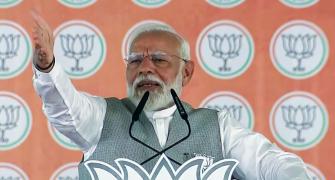The first half of calendar 2005 has been exceptionally good for Indian deal-makers and corporates alike. The total count of deals in India during the period was 189 compared to 105 during the same period last year.
M&A volumes were up 34.23 per cent from last year at $5,974 million. Notably, India has been ahead of other prominent Asian economies in terms of growth in M&A volumes and deal count.
In fact, India has seen the highest momentum in M&A activity across the globe next to Japan. The total number of M&A deals in the first half of 2005 were up 80 per cent compared to the global average of 5.40 per cent and the Asia Pacific (ex-Japan) average of 6.57 per cent, according to M&A data available from Bloomberg. Will the going be as good in the second half?
Amit Chandra, joint managing director, DSP Merrill Lynch, talks to N Mahalakshmi about what will drive M&A activity in future.
What is your reading of the M&A space in the country right now?
In India, the number of M&A deals has gone up sharply. This is because of some consolidation happening at the middle and bottom ends of the market, coupled with the fact that there is capital available in the market.
But a large number of deals does not necessarily account for the bulk of the value, which still comes from a few big deals. What we have seen in India is that some large defining deals happen every year.
What do you think will be the drivers for M&A deals in future?
If you look at the top end of the market, going forward, the drivers are going to be less domestic consolidation and a lot more international expansion. Two things have happened in the past, which are now defining the space.
Firstly, at the high end of the market, in all the major sectors, the low hanging fruits or the obvious consolidation targets have played themselves out. There are only a few obvious targets left. Pretty much the entire spectrum of industries, whether it is old or new economy - for instance cement, telecom, banking and pharma - has seen a fair degree of consolidation.
Secondly, with the economy doing a lot better and the markets doing even better, the desire to sell has diminished. Especially in India, we have seen that whenever people have access to capital they rather choose to retain control.
Our view is that M&A deals are going to be less about sectoral themes in the near future. It is going to be opportunistic moves by individual players - it could be to play the domestic story or to create a global footprint. In case of international deals, it will be the need or the desire for international acquisition or creation of a global footprint, which will be the driving force.
Initially companies will do deals either to diversify their business risk or acquire assets wherein they can add disproportionate value to shareholders. In certain cases, it could be to build linkages in the value chain.
For instance, in the case of VSNL and Tyco, the former could add a chunk of international gateways and underwater cables, etc. to its telecom business and provide a more integrated service.
Do you think that the momentum that we have seen in the past year would continue going forward?
It is hard to predict. Right now a lot of businesses are attracting immense liquidity and that is not necessarily the right environment for deals to happen.
For instance, the entire commodity sector is delivering very strong returns now. So not a lot of assets are changing hands since buyers ask themselves if they are buying at the top of the cycle. Sellers, on the contrary, are tempted to retain their business as it is generating cash and growing.
Which is why companies like Bharat Forge, Mahindra & Mahindra and Tata Motors are shopping around to buy when there is stress in the cycle, so that they don't have to put in too much capital. Every industry has its own cycle. So in the next three-five years different industries could go through stress at different points in time, triggering sector specific M&A activities.
Currently, Indian corporates are well capitalised. Their balance-sheets are strong. Interest-coverage ratio is at an all-time high. Net debt levels are at an all-time low. Cash flows, too, are strong. Thus their ability to leverage is at an all-time high. So if you think about it, it is the perfect environment in which people would want to be.
Several commodity players have been talking about capacity expansions. Does that worry you and what happens if it lessens the prospects for M&A activity?
Domestic capacity expansion is not happening at a dramatic pace. Generally, managements are exercising caution after the lessons of nineties. For instance, in cement there is a low degree of action. Steel, yes; several players have announced big plans, but we have to see, which ones will actually be executing going forward.
But then, there is capex happening in pockets. We are bullish about capex spending in general. We are projecting upwards of $25 billion every year over the next three-four years. This is going to be led by infrastructure apart from heavy industries like power, telecom and petro chemicals.
How is the competitive landscape in investment banking shaping up...
India is hot right now. So everyone wants to enter India. But it is a tough market to penetrate because it is still very relationship-based. And more so because you get into a strategy which is very private to clients and also because it has low margin levels.
The only differentiating factor is your execution capabilities for which one needs a record as the entry barriers in our industry aren't much.
Do investment banks also need to be total financial service providers?
There is some merit in that argument. Either you service your clients fully or you specialise at something and do that really well. A half-way house may not necessarily work over a long period of time.






